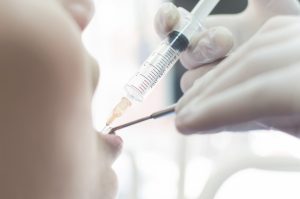By Candace DeLapp, D.D.S. and Linda Siderius, Esq.
From the Fall 2022 Journal of the Colorado Dental Association

Helping patients feel calm, relaxed and at ease during an appointment is a critical part of dentistry and opens the door for more complex procedures. Let’s clarify some basics for the dental practitioner on the subject of anesthesia.
According to the Code of Colorado Regulations (3 CCR 709), here are the anesthesia privileges included in your (dentists only) Colorado dental licensure:
- Local Anesthesia;
- Analgesia;
- Medication prescribed/administered for the relief of anxiety or apprehension to non-pediatric patients, limited to the following:
-
- A dose of a single drug (no more than the maximum recommended dose) that can be prescribed for unmonitored home use; or
- The above plus nitrous oxide; and
- Nitrous Oxide/Oxygen Inhalation Analgesia in compliance with section
G of Rule 1.14. *CCR 1.14 E. Anesthesia Privileges Included in Colorado Dental Licensure pg. 33
Properly trained dental personnel may monitor and administer nitrous oxide under the dentist’s direct supervision. The dentist is responsible for determining and documenting the maximum percent-dosage administered, including the length of time nitrous oxide was delivered.
Patients frequently desire or require a higher level of sedation. Minimal, moderate, deep sedation and general anesthesia requires a permit from DORA. Many dentists prefer to engage the services of an anesthesia provider for moderate sedation, to operate more comfortably in their own practice. Dentists often turn to Certified Registered Nurse Anesthetists for these services.
This frequently raises the CRNA question: Who writes the prescription? The issue is, who has the DEA registration?
If a CRNA has a DEA registration and prescriptive authority (via the Nurse Practice Act), he/she can order the drugs, obviously administer the drugs and must also be responsible for the storage, wastage, and logging of the agents.
CRNAs do not, by law, have to have a DEA registration to administer anesthesia. This is very specifically spelled out in the Nurse Practice Act. CRNAs, commonly, do not get DEA registration if they are working with/for practitioners who do have DEA registration. The dentist (or other practitioners) who have a DEA registration must order the agents, be responsible for storage (locked up), wastage, logging and documentation regarding the use of the agents. The CRNA is responsible for documenting the administration of, including amounts, any reactions, etc.
The drugs follow the DEA registration of the prescribing dentist. The CRNA cannot take the drugs with him/her. He/she would not have authorization for any of these drugs to be transported by car (or any other means). The drugs have to stay with the ordering dentist (DEA registration) for wastage, storage, etc. If the CRNA, without DEA registration, was pulled over and the car searched, he/she and the dentist would be in trouble with law enforcement, including the DEA, as well as respective licensing agencies.
Therefore, it is recommended that dentists who use CRNAs as independent contractors to provide anesthesia services have a written agreement. Any agreement should spell out who is responsible for what, including the drugs, resuscitative equipment, etc. in line with the Dental Practice Act (and Nurse Practice Act). Further, the dentists should make themselves, if not already, familiar with the DEA rules/regulations on storage, wastage, and documentation of anesthesia agents.
It is additionally important that the dentist is aware that “a clinical on-site inspection is also required of any dentist who is not issued a Moderate Sedation Permit or Deep Sedation/General Anesthesia Permit and instead contracts with an anesthesia provider that is not subject to the rules and regulations of the Colorado Dental Board (i.e. Colorado licensed physician or certified registered nurse anesthetist (CRNA)) prior to the administration of moderate sedation and/or deep sedation/general anesthesia in his/her dental office. See CCR 1.14 Anesthesia L. Clinical On-Site Inspection for Obtaining, Renewing, or Reinstating a Moderate Sedation or Deep Sedation/General Anesthesia Permit pg. 39.
A dental anesthesiologist will have their own prescriptive authority and DORA permits under the Dental Practice Act. “A separate clinical on-site inspection is not required for dentists who receive a Moderate Sedation Permit or a Deep Sedation/General Anesthesia Permit pursuant to this Rule 1.14 for one dental office and travel to other dental office locations in Colorado to administer anesthesia.”
Finally, it may be “just a cleaning” to us, but many patients benefit from local anesthesia. If your dental hygienist performs hygiene when you are out of the office (indirect supervision) they must obtain a Local Anesthesia Permit for Dental Hygienists.
The profession of dentistry has long been recognized for its compassion and empathy. Providing safe and comfortable dental care for your patients is more easily obtainable today than ever before. Please visit The Trust website at www.tdplt.com to view a copy of the Code of Colorado Regulations or contact The Trust with your questions.
Candace DeLapp, D.D.S., is the executive director of the Dentists Professional Liability Trust of Colorado. Contact her at 303-357-2604 or hdelapp@berkleyrisk.com.
Linda Siderius, Esq. is an attorney with Caplan and Earnest.


